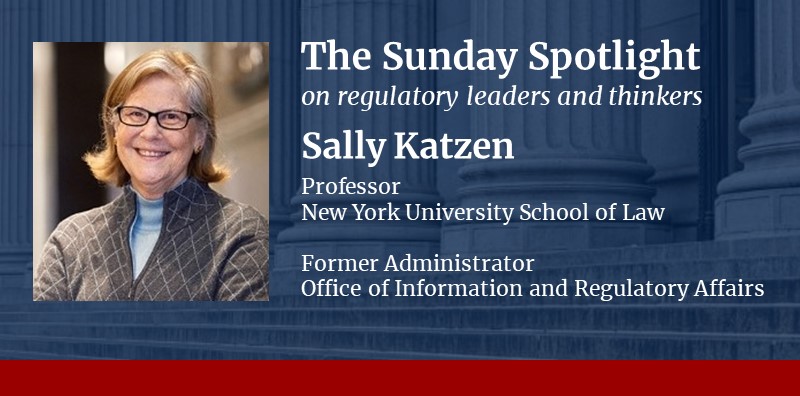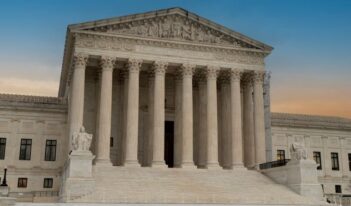
Sally Katzen, former OIRA Administrator, comments on recent Supreme Court changes to administrative law.
In a recent conversation with The Regulatory Review, Sally Katzen, an administrative law expert and former Administrator of the Office of Information and Regulatory Affairs (OIRA), offers her thoughts on recent developments in administrative law.
Katzen discusses how recent U.S. Supreme Court decisions have disrupted longstanding principles of administrative law and she suggests that they have blurred the line between the law and politics. Although Katzen finds that recent Court decisions have raised difficult questions about the future of administrative governance, she continues to find inspiration in teaching the next generation of government lawyers. Katzen specifically pushes back against a narrative, popular in some quarters, that treats government as the main source of society’s problems. She hopes that her students, and others, will see government as an essential force for solving problems.
Katzen is Professor of Practice and Distinguished Scholar in Residence and Co-Director of the Legislative and Regulatory Process Clinic at New York University Law School. Katzen served in the Clinton Administration as OIRA Administrator, deputy assistant to the president for economic policy, deputy director of the National Economic Council in the White House, and deputy director for management at the Office of Management and Budget.
The Regulatory Review is pleased to share the following exchange with Professor Katzen.
The Regulatory Review: What’s are your thoughts about recent developments in the field of administrative law?
Katzen: I’ve spent the bulk of my professional life—over six decades—working and now teaching administrative law and regulatory practice. What recently occurred to me is that I am beginning to sound like my mother: “This isn’t the way we did it when I was growing up.” So much has changed—almost everything—since I entered the field. And it has happened in the last few decades, with most of it in the last few years: the non-delegation doctrine; appointment and removal of government officials; tightening the requirements for standing; distain for the use of legislative history in statutory construction; criticism about deference to agency expertise and experience; and the creation of a “major-questions” doctrine. I’m sure there are more, but these come readily to mind. In a way, I can now understand how the (true) conservatives felt when the New Deal Court changed the law as they knew it—somewhat aghast and very disturbed. But that’s little consolation for me now.
The Regulatory Review: How do these changes affect your teaching?
Katzen: Teaching administrative law today certainly presents new challenges for me. I can explain recent decisions of the Supreme Court, but how do I defend them? Is it the law that is evolving, or is it politics that has entered the field? Does it matter? And I really don’t like always resorting to “watch this space” at the end of each unit or telling the students: “This is the law, for now.”
The Regulatory Review: Yet you continue to teach and speak and write on the subject. Why?
Katzen: I still teach and talk and write because I still want to inspire bright young lawyers to enter government service. It truly is a noble calling. I’m often asked about my career path by those thinking of going into the government, and I answer but then say it’s different for everyone and often a product of timing, field of interest, and luck. But there’s no wrong way to begin, whether as a career civil servant or as a political appointee, as a lawyer or as a policy person, in Washington, D.C., or at the state level. There’s so much that can and should be done by thoughtful, talented, considerate, and hard-working people. And whatever the path, the reward is extraordinary.
The Regulatory Review: What in particular would you like students of administrative law to focus on or contribute to with their government service?
Katzen: I could go on for a long time, but the short answer is to help restore faith in the government and confidence in its ability to confront and solve the pressing problems of the day for the American people. There was a time when we turned to government to ensure that our food was pure, and our air and water clean, our cars, trains, and planes were safe. We turned to government so we could have confidence that our drugs were safe and effective, that our markets were fair and competitive, that our money was secure in various financial institutions, and on and on. But at the end of the last century, we were told—and retold and retold—that the government was not part of the solution, but instead was part of the problem. And for the last several decades, our faith and trust in government has consistently slid downhill. We can change the narrative if strong, dedicated, responsible, and responsive people go into the government and demonstrate convincingly the capacity for achieving good. In our field, it means sensible, thoughtful rulemaking, supported by clear and transparent analysis and implemented with fairness. I should probably stop before I fall off my soapbox. But thanks for the questions.
The Sunday Spotlight is a recurring feature of The Regulatory Review that periodically shares conversations with leaders and thinkers in the field of regulation and, in doing so, shines a light on important regulatory topics and ideas.



